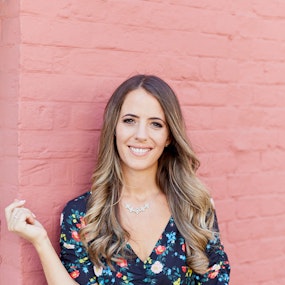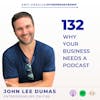Why You Should Focus on Wealth Creation, Not Income Generation w/ Catherine Morgan

Did you know there are three surprisingly common ways we unknowingly cap our own ability to earn money? In this episode, Catherine Morgan shares what they are and how to avoid them, so you can grow a business and hit your revenue goals with ease.
Did you know there are three surprisingly common ways we unknowingly cap our own ability to earn money?
If you're ready to break through your money narrative and finally learn how to grow a business and create real wealth, today's episode is a must-listen.
As a financial advisor and wealth expert for entrepreneurs, Catherine Morgan is on a mission to show you how your inherited money-beliefs may be capping your income potential (and how to fix it).
BY THE TIME YOU FINISH LISTENING, YOU’LL DISCOVER:
- The most important asset you have to grow a business (hint: it’s not money)
- How inherited money-beliefs — not your business growth strategies — may be capping your income potential
- The difference between income generation vs. wealth creation
- The 3-step plan to grow a business and create real wealth
Also, be sure to grab a copy of Catherine’s new book, It’s Not About The Money at catherinemorgan.com/book
Instacart - Groceries delivered in as little as 1 hour.
Free delivery on your first order over $35.
_____________
Liked this episode? Pay it forward and share it with a friend.
Love the show? Write a 5-star review — even one sentence helps us keep bringing you the content you want to hear.
More from Courtney:
- Website: theeffortlesslife.co
- Instagram: @thecourtneyelmer
Some product links on this site are affiliate links, which means we'll earn a small commission for any affiliate purchases you make (at no additional cost to you). We only recommend products that we use and/or personally trust, so you can browse with confidence.
All Rights Reserved | © The EffortLESS Life®
Courtney Elmer 0:00
Hey, welcome back. I’m Courtney Elmer. It's the AntiFragile Entrepreneurship™ podcast. This is Episode 99. Today I have a finance expert joining us who is going to show you why it is so critical to get a solid revenue generating system in place and specifically, how to put financial well being at the heart of your business strategy. Because even if you're not motivated by money, you need it to grow your business and chances are you already know that otherwise, why would you have a business right? Our guest Catherine Morgan today is going to give you the three step blueprint to creating real wealth and how to grow a business. Stay tuned.
Courtney Elmer 3:39
Does the topic of money feel uncomfortable for you? If you answered yes, you’re 98% of the people out there who experience some kind of resistance around money. This is why I was so excited when today's guest, Catherine Morgan, reached out to me about sharing her process for creating real wealth with you.
Because after spending many years in the financial planning industry, she is now on a mission to demystify the numbers and help entrepreneurs. You put financial well being at the heart of your business strategy so you can create real wealth for yourself, for your family, and to leave a legacy. Catherine is going to show you how to identify your current money narrative, shift the lens through which you're looking at money right now, and implement her three step plan to grow your wealth. Catherine, welcome to the AntiFragile Entrepreneurship™ podcast. I'm delighted that you're here today to discuss how to grow a business and business growth strategies!
Catherine Morgan 5:57
Thank you so much for having me. It's so wonderful to be able to talk across the waves about how to grow a business and business growth strategies! I'm sitting on a little island, sandwiched in between the north coast of France and the southern coast of the UK.
Courtney Elmer 6:12
That's amazing. Technology is such a gift. As I was learning about you and your areas of expertise, the thing that jumped out at me is how you’re on a mission to help make the complicated world of finance simple. Something you speak about often is the idea of money having these two sides. I’d love to start there and have you tell us more about that. What are these two sides of money?
Catherine Morgan 7:04
When we think of a coin, that coin has two sides. In our country, certainly, it's got a queen and a king. It's got a feminine and a masculine side to it. It's got a practical side and an emotional side. When I was growing up, I had a terrible relationship with money. My dad was an entrepreneur, my mom was a stay at home mom, and I had this polarity or around how I felt about money. On one hand, I could see that money created so much opportunity and freedom and independence. And on the other hand, I experienced money being used in quite a manipulative way.
One of the causes that I support is around financial abuse, because the experiences that we have around money can have a huge impact on how we treat money, and ultimately how we treat ourselves. Because our ability to receive wealth is often mirrored by our ability to be loved. It’s that mirror reflection, the two sides of the coin, that the way we treat money is a mirror reflection of how we treat ourselves.
I was in financial services for 20 years as a financial advisor. And yet I still lived in these consecutive cycles of debts, and I experienced a lot of shame and a lot of guilt around money. It was then that my son got sick with bacterial meningitis, we almost lost him. And a year later, I was diagnosed with PTSD, post traumatic stress disorder, and I went into a huge spiral of anxiety and debt.
When I came out of that, I remember sitting in the bank thinking “Gosh, how many people feel this way about money?” “How many people don't understand the jargon that I experienced in the hospital with my son, and how many people bury their heads in the sand because we don't want to think about money.”
I quickly decided that if I was going to change my relationship with money, I had to think about some of the traumas and the inherited beliefs that had been passed on from generations in order to actually improve my ability to receive, hold onto, and give wealth. If our ability to receive, hold onto, or to grow our wealth isn't at a good or positive level, then we're never going to be able to have the capacity to experience more wealth in our lives.
Courtney Elmer 11:19
I had chills when you mentioned that our ability to receive wealth is mirrored by our ability to be loved and love ourselves. There is such a deep conversation that could be had around that. I'm curious to hear Catherine, what are some of the other inherited beliefs that you see people carrying about money and how to grow a business and business growth strategies?
Catherine Morgan 11:48
The ones that I hear most often are, “money doesn't grow on trees, you have to work hard to make money, that being wealthy is mean, and greedy, or selfish in some way.” There's quite an interesting dynamic around borrowed beliefs for men versus borrowed beliefs for women. Because if you go right back to human DNA, men are the hands of hunter gatherers, and women are the caregivers. And whilst that's not so present in our current society, these inherited beliefs around our culture, and as human beings have a huge influence on those borrowed beliefs.
So for example, a lot of men experience a very status driven relationship with money. Whereas for women, it has more to do with how we can use money to help more people. So often, the borrowed beliefs that I find in our communities specifically for men tend to be the ones centered around “working hard, and that money doesn't grow on trees.” And for women, it tends to be more around, “if you have the money, it means that somebody else doesn't have it, or money comes with strings attached.” Those are kind of some of the most common patterns or behaviors that we see with borrowed beliefs.
Courtney Elmer 13:45
There was a time in my life where I carried so many of these beliefs not even knowing I was carrying them. My own relationship with money has evolved through the years and there have been many layers to it. So for someone listening who is maybe intrigued by this conversation about stories and beliefs about money, but aren’t sure what to do with that information, where would you guide them to start?
Catherine Morgan 14:32
The first thing is awareness around what I call the “shoulding statements” around money. “I should be making more money in my business. I should be outsourcing more, I should be systemizing things in my business to earn more money. I should not be in debt.”When you hear yourself thinking these things, what it actually is telling us is that you're connecting your sense of self with money. “I have debt, therefore, I'm bad.” People attach money to their identity.
It creates cognitive dissonance, which in the field of psychology is when we hold on to these contradictory beliefs or ideas or values, and we feel stressed, we feel anxious, we feel fearful. So I always think about, what are some of the narratives or the things we're hearing ourselves saying about money?
What are these “shoulding statements” that we're telling ourselves? If we are able to bring some awareness to those things, that's half the battle. The beauty of awareness is that it allows us to then flow into “Okay, so now I have this awareness about my money, beliefs, what do I actually do about it?”
I always ask clients to think about this: “now that you’re aware of these beliefs you have around money, how is this belief supporting you?” So for example, if your belief is that money doesn't grow on trees, or you have to work hard to make money, maybe that’s supporting you because it allows you to work hard and get things done. But the flip side of this coin is, how is this belief sabotaging you? If we let that belief go and handed it back to whoever gave us that belief, what would be possible for you?
Courtney Elmer 18:12
When you stop for a moment and imagine the possibility of a life without that belief, already it's a door opening. Growing up, money was such a sore topic in our family, so I always thought that money was stressful because any conversation about money in our family was a stressful conversation.
I carried that with me for years thinking that money was stressful, until one day I realized this belief and I said to myself, “Courtney Elmer, money is not stressful. It's the lack of money that is stressful.”
Catherine Morgan 19:36
Yes and if you take that one step further, it's the meaning that we attach to money that creates that feeling or that sense of not enoughness. The story I always tell here is that I remember when I was about seven years old, my Nan would always give me a little bit of pocket money. When she handed me the money, she always used to say to me, “don't spend it all at once.”
For me, as a child, when I heard “don't spend it all at once” I thought it meant I have to hoard money and to protect it, because it’s limited in some way. My Nan, she grew up during the war. Everything was rationed, everything was limited. So of course, her relationship with money was going to be very much governed by that experience of her culture and the environment that she was living in. For her, there was nothing wrong with saying to me, don't spend it all at once
Now, we can't go back and change the things that people said to us, or change our environment, or our experiences. But what we can do is put a new lens on that and think about, well, is the perception I attached to money back then actually true? Is it true that you have to hoard money? What are the benefits of me holding on to that belief? On the positive side maybe it means that I'm going to be an excellent saver, But on the flip side, the sabotaging side, I'm probably going to be fearful of taking risks. I might be fearful of sharing my wealth, because I feel it's limited.
It's bringing that awareness to the perception and the meaning that we have attached to every single experience that we've ever had, particularly in those very, very early days.
Courtney Elmer 22:51
Yes. And something else that you talk about that I find fascinating is having boundaries on ourselves around our ability to earn and receive, can you tell us more about what that looks like specifically?
Catherine Morgan 23:04
Yeah, boundaries are interesting aren’t they? So often, we put a conscious lens on how much we value money. We focus on how many sales we're making in our business, how many new clients we're generating, how many new customers are buying our online courses and those kinds of things.
But actually, the one most important asset in our world is time, because we can't create more of it.
What's interesting for me about the concept of how we value time, and how we value money, are the boundaries that we create for ourselves around our time and our money. Time is one of the most important assets that we want more of. So what boundaries could you put in place to safeguard time and to safeguard money so that you can step into a place of empowerment, not disempowerment.
Courtney Elmer 25:17
Yes one hundred percent. Catherine, I'd love to hear some practical tips on how we can begin to put these boundaries in place to protect our time to earn more wealth. What does it look like to plan a financial future, and be able to create wealth? How can we create wealth to grow a business?
Catherine Morgan 26:10
First, you have to understand what your financial values are so you can hold strong boundaries around those financial values. The question you want to ask yourself in the context of money, is “What is important to me about money?” So that's definitely something I would get clear on for those boundaries is, first of all, what are your financial values? How are you spending money in alignment with those values? And then how can you put these strong boundaries around that so that you're always in a sense of alignment?
Courtney Elmer 29:35
Bringing values into the financial conversation is so brilliant. If you’ve adopted someone else’s values and are trying to operate by someone else’s values, it’s going to feel out of alignment and your goals will be a lot harder to achieve. Because if you're not clear on what you value, then it will be easy to chase what other people value and what they're telling you you should do based on their values. And that can get so confusing and so muddy so quickly.
Catherine Morgan 30:37
The other important thing to think about with values, is that often when we set goals, financial goals, we set them based on either other people's expectations, or we set them on goals that are way too far in the future. But we need to make sure that our goals are moving towards desires rather than away from pain. So that's always a question to ask yourself, when you're setting goals for yourself. Are you setting a goal to move towards something that you desire? Or are you setting goals where you're trying to move away from pain? How many of us sit on a couch on a Sunday night and say the diet starts tomorrow, because I need to lose twenty pounds. And the goal is focused on moving away from being twenty pounds overweight. So when we lose twenty pounds, we’re happy for maybe a very short period of time but then we put all the weight back on again, because we need to feel the pain in order to be motivated again towards the goal.
As opposed to thinking about what motivates you to lose twenty pounds? Maybe the reason is because you desire a healthier lifestyle or a healthier body. And so the motivator the goal becomes more in sort of entrenched in pleasure as opposed to coming away from pain. Does that make sense?
Courtney Elmer 33:04
Yes. And when you begin to understand this, you can start applying this in every area of your life. When you can reverse that process and start working towards something that you desire, rather than away from something you don't want, you're able not only to reach your goal more effectively, you're able to sustain it for the long term. That's the difference.
Speaking of differences, can you describe the difference between wealth creation from income generation? How do we need to be approaching that differently in terms of thinking of generating income, making sales, bringing in revenue, and actually creating wealth?
Catherine Morgan 35:39
If you look up the word wealth, it's defined as the accumulation of resources, physical assets, properties or savings subtracted from your liabilities, your mortgage, or rent payments. But the problem with the definition of wealth in the dictionary is that it suggests that in order to be wealthier, we have to have more assets. But we know that having more money or more assets doesn't necessarily equate to greater happiness.
So the way that I perceive wealth has more to do with wellbeing. It’s the question of, how do we create that sense of well being and prosperity over creating more money? Money has no specific purpose until we decide to give it a purpose. Money is incredibly logical, and money is incredibly emotional.
Wealth creation is about the feeling of our well being the what we're creating in terms of assets, what profit we're taking from our businesses, because if we're making loads of income, but we're not managing our expenses well enough, then we're not actually creating enough profit that enables us to create more wealth and more well being. So that's the difference for me between income, and wealth and how it can be applied to grow a business
Courtney Elmer 38:09
Makes so much sense. So for those listening today about the inherited beliefs about money, and how we need to get clear on our values around money, so we can set boundaries around money and shift our perspective on what wealth means, what’s their next step? Where should they start?
Catherine Morgan 39:06
Great question. I would encapsulate everything that we've spoken about in two steps.
Step number one is get financially naked. What I mean by that is, strip everything back and bare your narratives, your beliefs, and stories around money, that's the first step. Part of that might be practicing some forgiveness work, handing back some of those borrowed beliefs that are not supporting you in moving forward with money.
Then, once you do that, take a look at your numbers and give every penny a purpose. Imagine every single dollar that's coming into your bank account, whether it's your personal bank account or your business bank account, as a member of staff in your business, you've hired them. You're going to go and give every member of staff a purpose. So think about that with money, you want to have a good relationship with that member of staff, you want to create good boundaries around it, you want to have good communication, you want to have good insights, you want to have good intentions, you want to have a good, good goals in place for where you're headed.
If you think about that, with money, how much more exciting do we now feel about looking at our numbers, remembering that it's the emotion, it's the meaning that we're attaching to it that makes us feel overwhelmed and scared and anxious and and frightened and full of guilt and shame.
But put all that emotion to one side, once we can understand our numbers, and then give every penny a purpose, that means something to you not to anybody else. That means something to you that's rooted in your values, that's going to enable you to feel much more proactive, not reactive, much more adult, much more empowered to take the next little incremental step. Change doesn't need to be radical to be meaningful.
Courtney Elmer 42:04
So good. I think we could end on that note. You have a book coming out soon, don't you?
Catherine Morgan 42:47
Yes, the book is called It’s Not About the Money. The book is split into three sections: deserve, create, and grow. It's super practical with some practical exercises that you can start implementing straightaway. But it's also full of some little golden gems of how we can actually have a better relationship with money and a better relationship with ourselves when it comes to wealth creation. So it's a practical book, but it also looks at money through the lens of trauma, to enable us to step through actually deserving to have money in the first place, hold on some more money, and then to grow wealth for our future.
Courtney Elmer 43:49
Is it available for pre-order? Or how can people get a copy? Do you teach how to grow a business?
Catherine Morgan 43:56
So if you're listening to this before the ninth of December, you can jump onto our VIP list. And we will email you on the launch day. Which is if you join our waitlist at catherinemorgan.com/book. We’ll send you a free copy when you pay shipping and handling.
Courtney Elmer 44:23
And where else can people connect with you online? Because after this conversation, I'm sure they're going to want to look you up and learn more from you.
Catherine Morgan 44:32
Yeah, great, the best place to find us is either on our own podcast, which is In Her Financial Shoes. You can also find us on Facebook or Instagram, as @CatherineMorganMoney on Instagram.
Courtney Elmer 44:47
Awesome. Catherine, I do have one final question for you. What does it mean to you to live an EffortLESS Life®?
Catherine Morgan 45:18
It's about stepping into a place of trusting ourselves, that what will happen will happen that things happen for a reason. And that whatever happens in our lives in our businesses, and our wealth creation, they happen for a reason at exactly the right time. And I think if we all practice a little bit more trust in ourselves, and our own abilities and our own self worth, that for me, would enable us to step into that feeling.
Courtney Elmer 47:02
So well said, Catherine, thank you for being on the show today, you're a delight and I am happy we discussed how to grow a business and finances.
Catherine Morgan 47:19
Thank you so much for having me. It's been delightful to be here to talk about how to grow a business and business growth strategies.
Courtney Elmer 47:25
I don't know about you, I definitely plan to go grab a copy of Catherine's new book titled It’s Not About the Money. And as Catherine mentioned, when you head to catherinemorgan.com/book, you can be the first in line to grab a copy as soon as it drops, and dive deeper into everything we've talked about here on the show today.
Now, if you've been listening to the show for a while, you know we are all about systems, how to grow a business, and business growth strategies here. I mentioned in a recent episode that systems are the glue, holding your business together so that you can get out and shine as the visionary leader that you're meant to be. Sure systems can help you bring in more leads, bring in more sales, generate more revenue and income. But if the systems on the back end, if your business is falling short, you're going to have trouble bringing in leads consistently, nurturing those leads consistently, and having them convert into revenue for your business consistently.
So one of the tools that I have been working on behind the scenes for you, is to help you automate your email nurturing to grow a business. Now, I know that might sound a little counterintuitive, because how can you nurture someone on autopilot? Shouldn't relationships be fostered in real-time? Well, the truth is that you can still foster that relationship and connection and do it in an automated way.
I’ve created a plug-and-play email automation that's going to help you increase your subscriber retention rates. Why? Because once you have this in place, you'll never have to worry about ghosting your email list again, especially when life gets busy.
No more fingers hovering over the keyboard wondering what to say to your list this week. This automation is going to help you do it automatically.
So coming up next week. It's our 100th episode discussing how to grow a business and business growth strategies. I have a special surprise for you to commemorate the occasion. And if you've been with me since episode one, kudos to you for sitting here week after week listening to me. I’m grateful to you for being here with me still to this day. And if you're new here, I'm so glad you're here because we often discuss how to grow a business and business growth strategies. I hope that what you hear here on the show is helping you. So you're gonna have to come back next week and see what I have for you. I'll meet you back here next time. Until then, go live your EffortLESS Life®.

Catherine Morgan
Financial Planner, Certified Financial Coach, Trauma of Money Method Practitioner, and Financial Abuse Specialist ™
Catherine Morgan is a multi-award winning qualified Financial
Planner, Certified Financial Coach, Trauma of Money Method
Practitioner, and Financial Abuse Specialist ™ to name just a
few!
Winner of the December 2019 ‘Best New Business’ in National
Business Women’s Award and featured as one of the top 30
female entrepreneurs to watch in Business Leader.
She's on a mission to disrupt the financial services profession
from one of complicated financial products to one that helps
focus on people not products.








